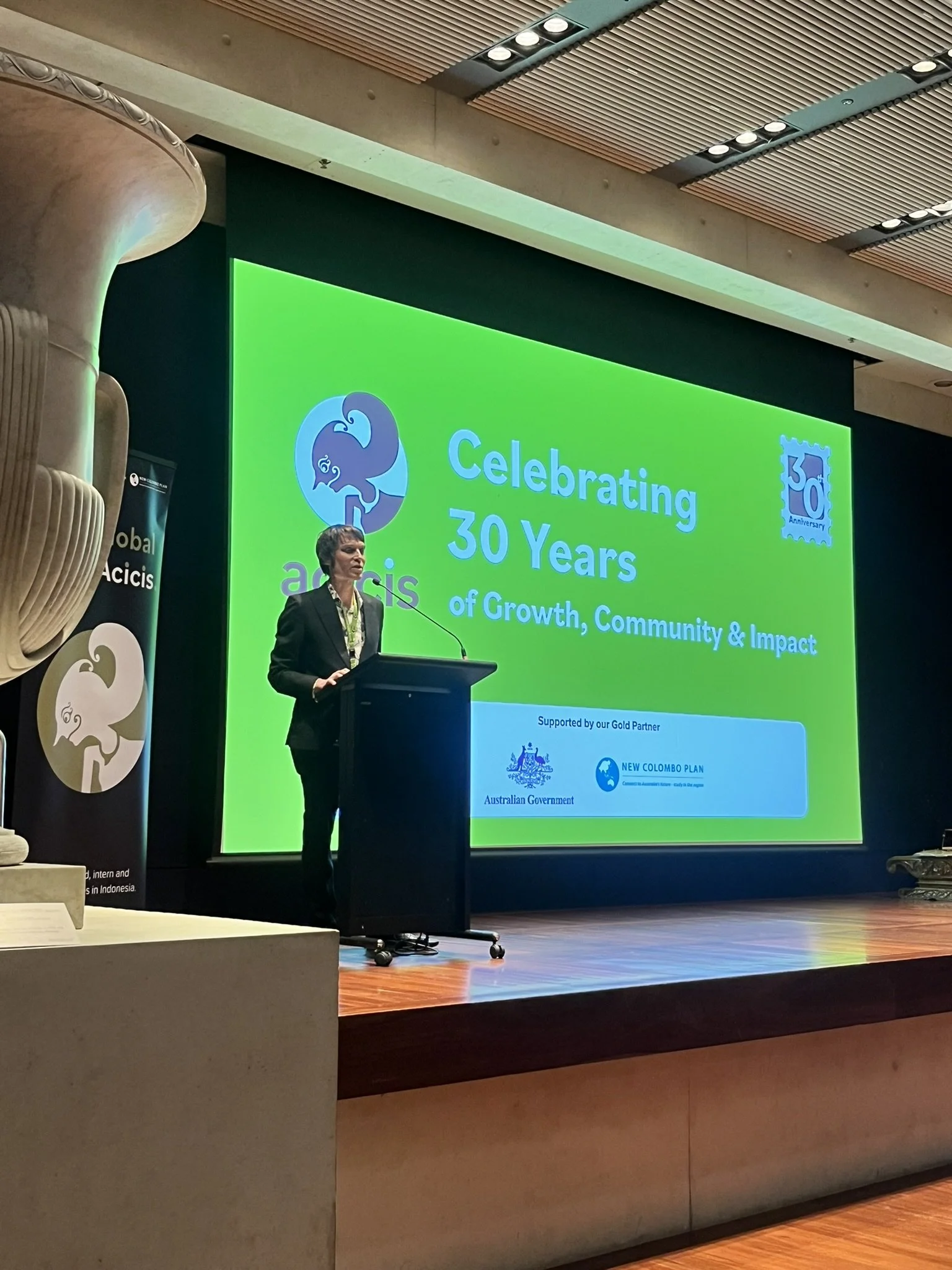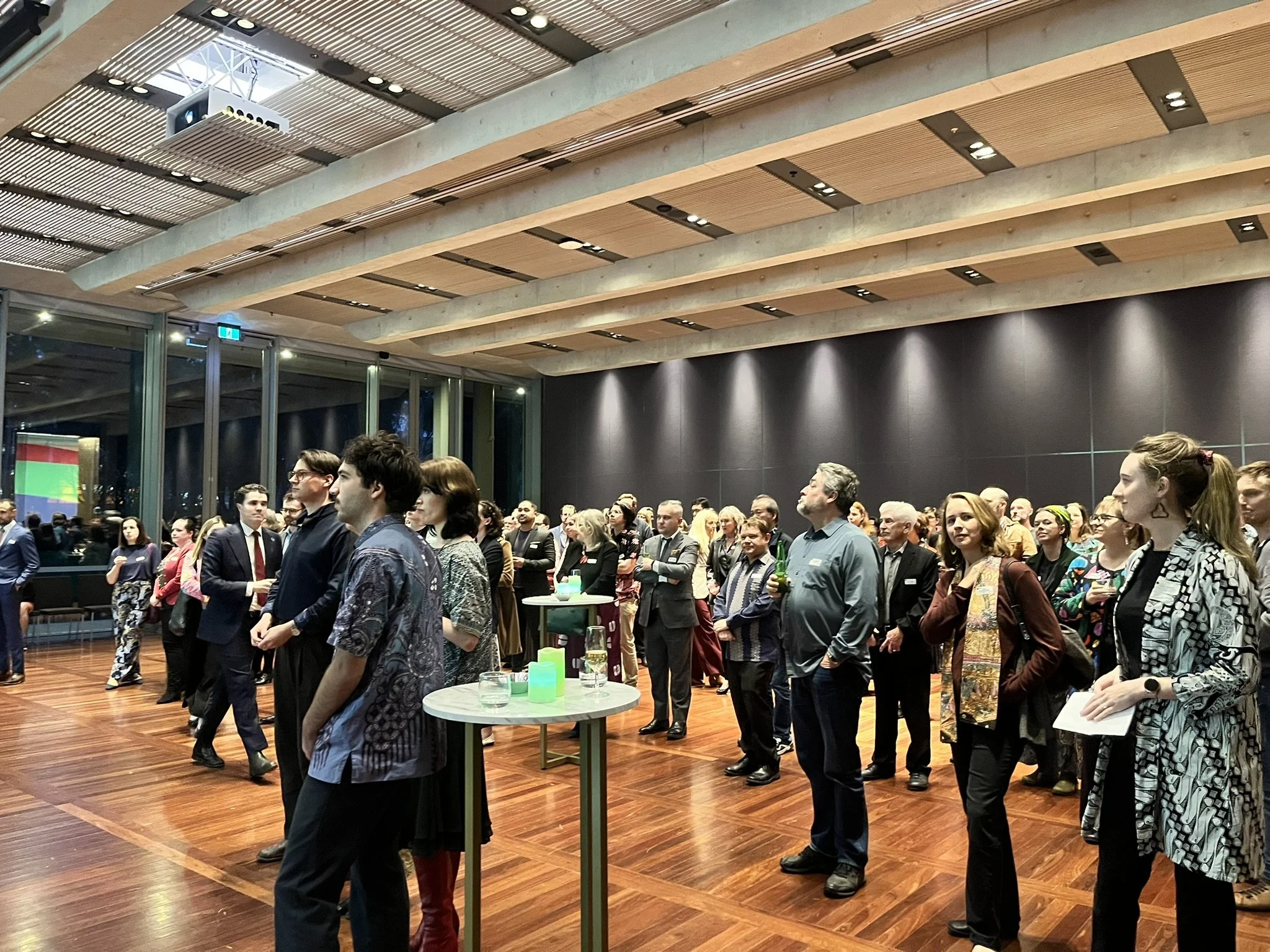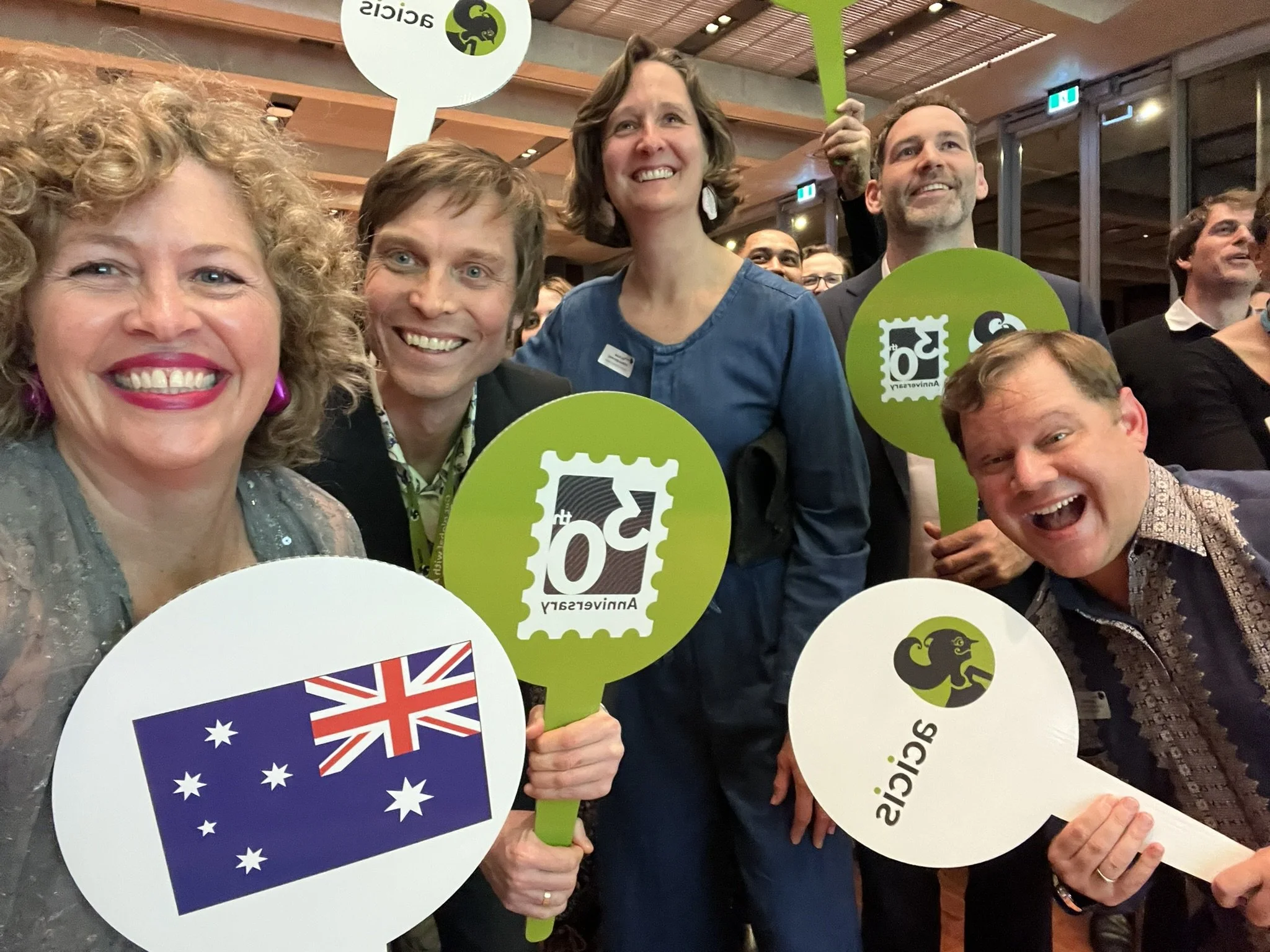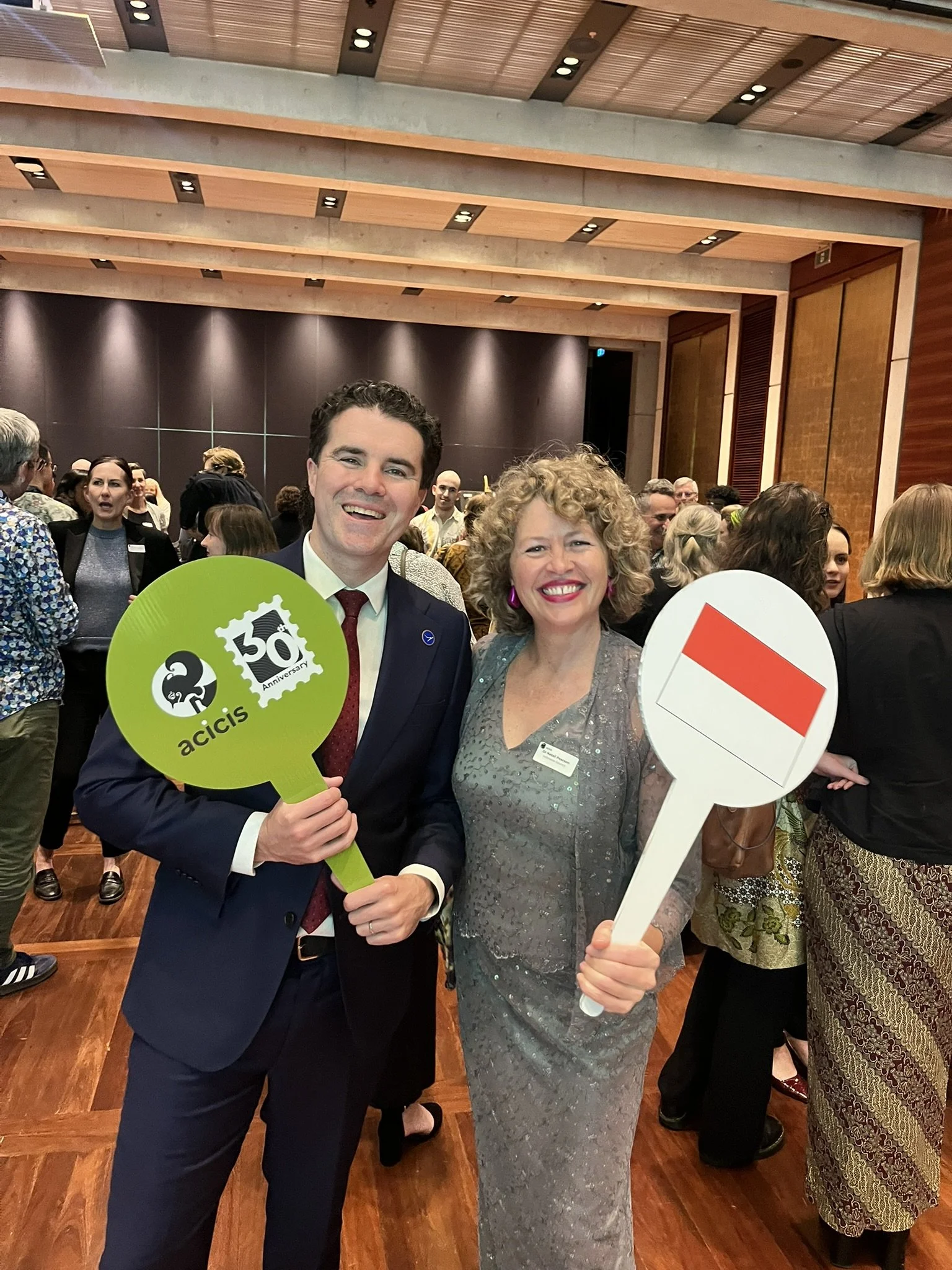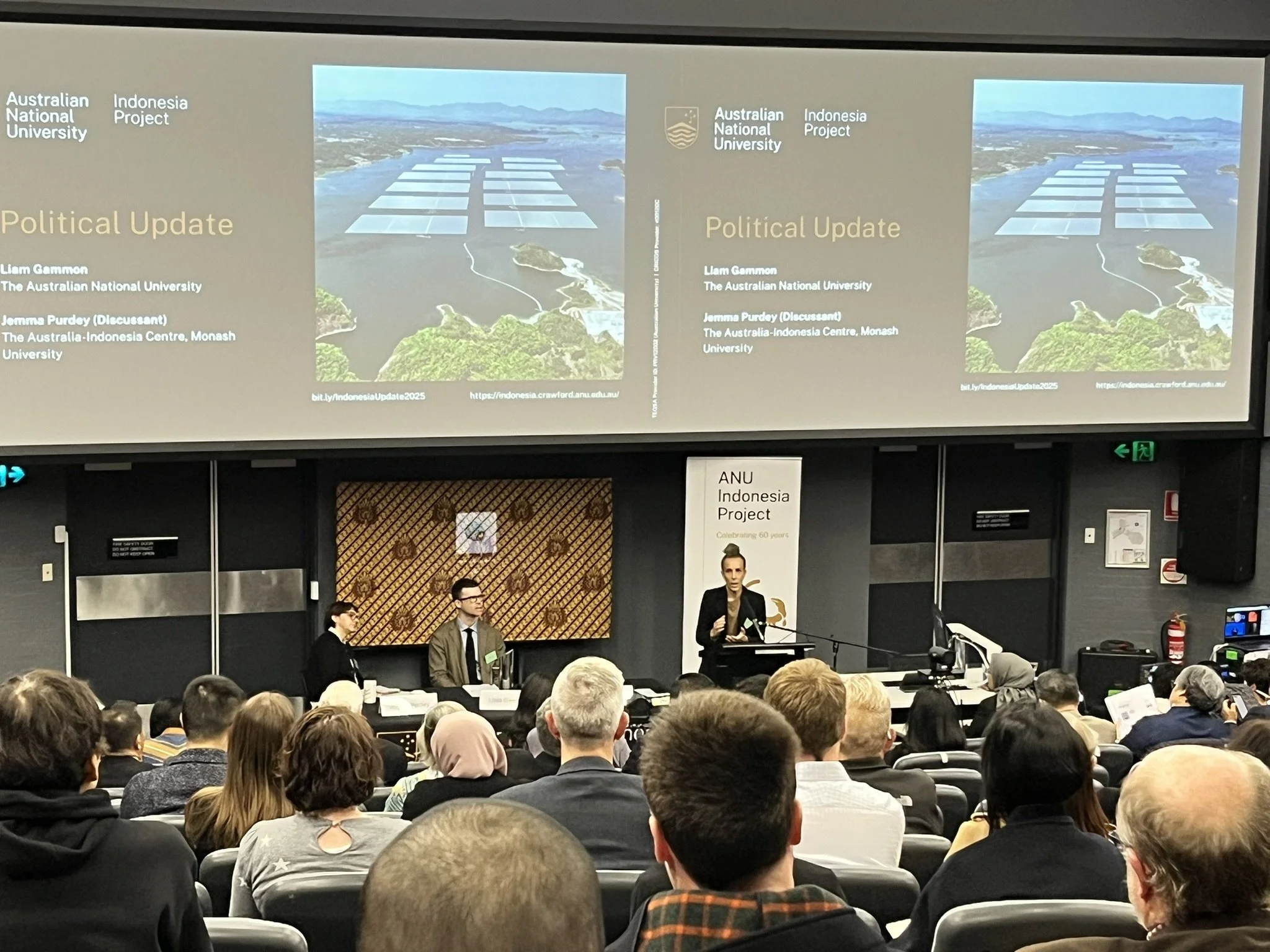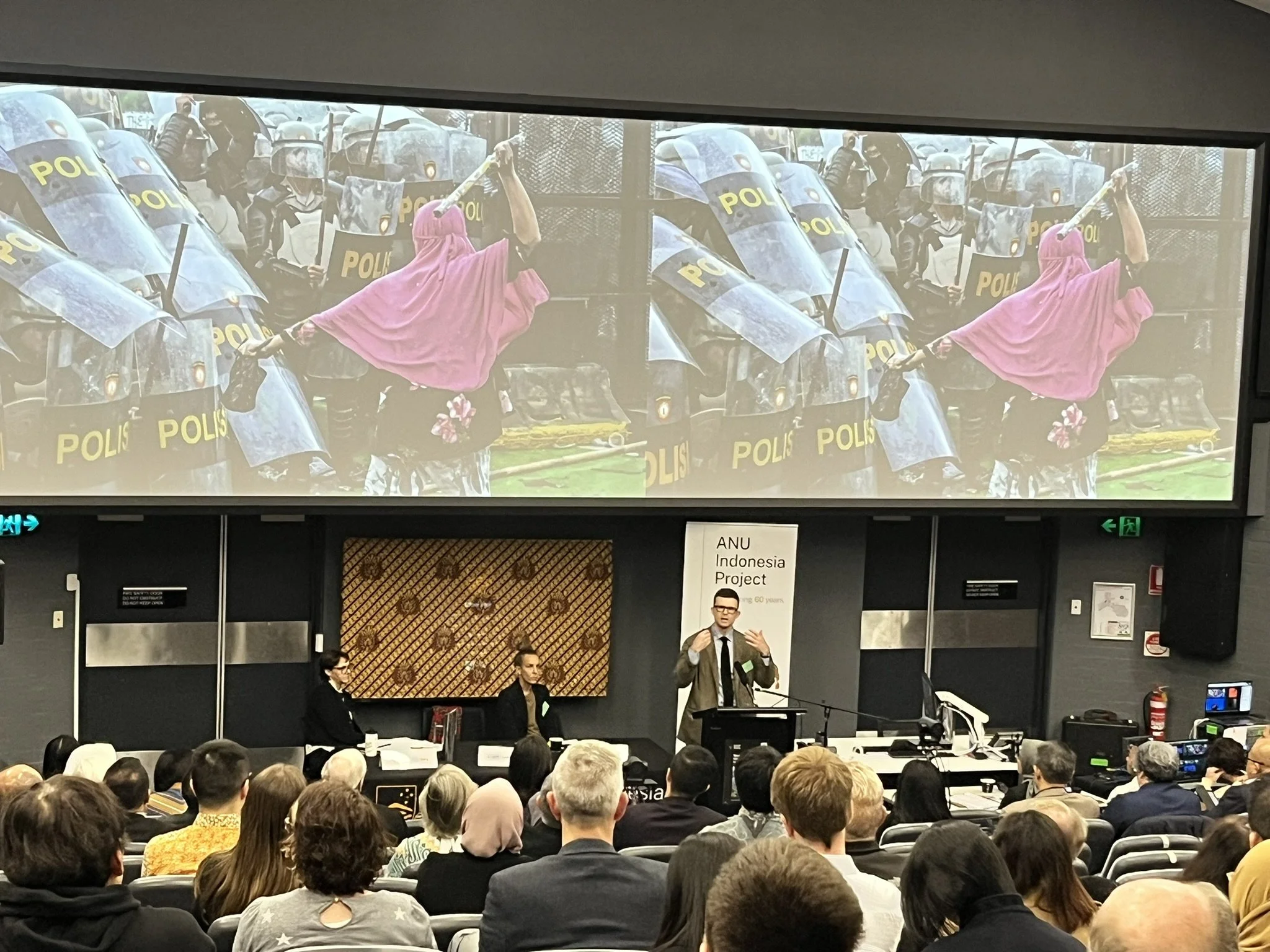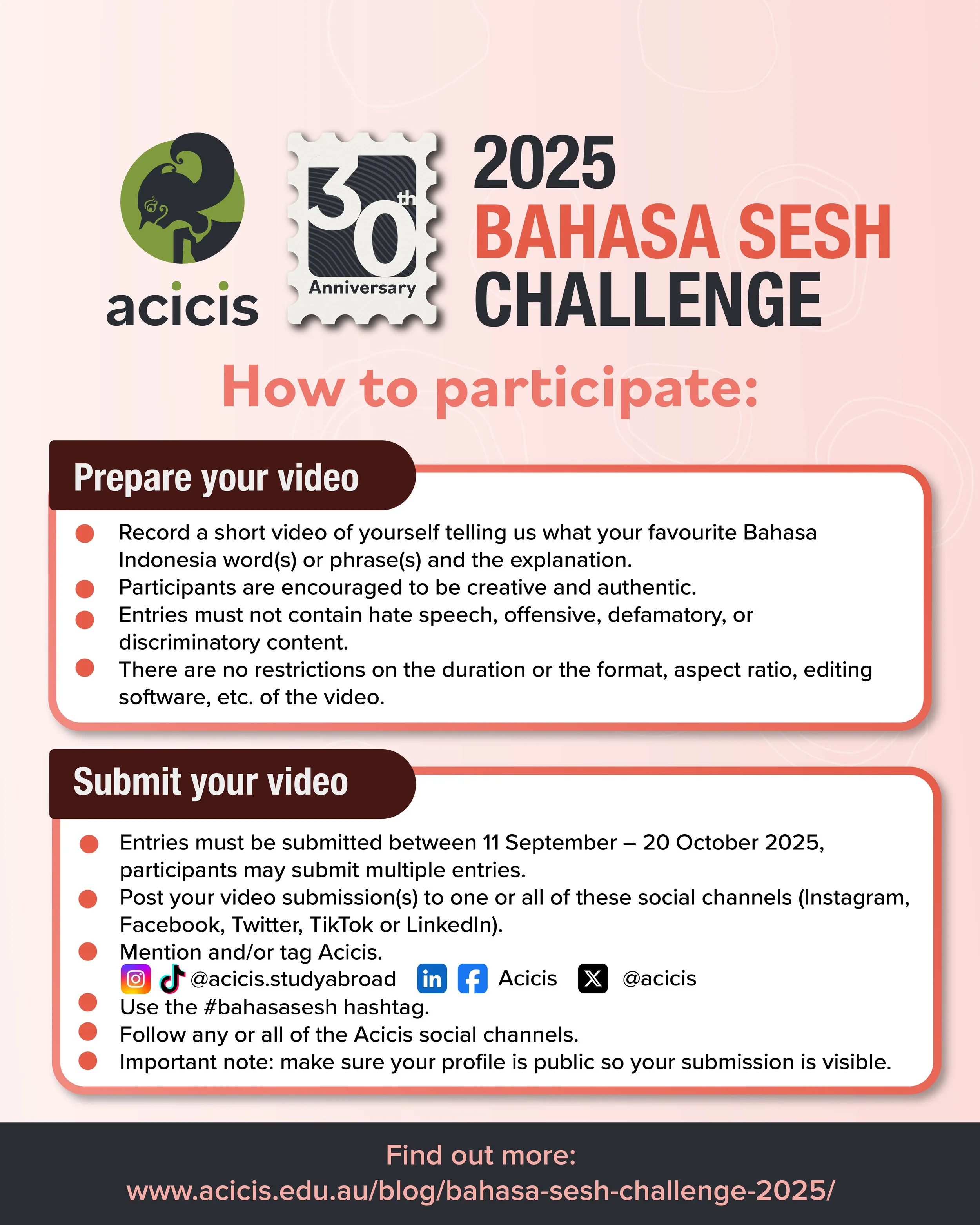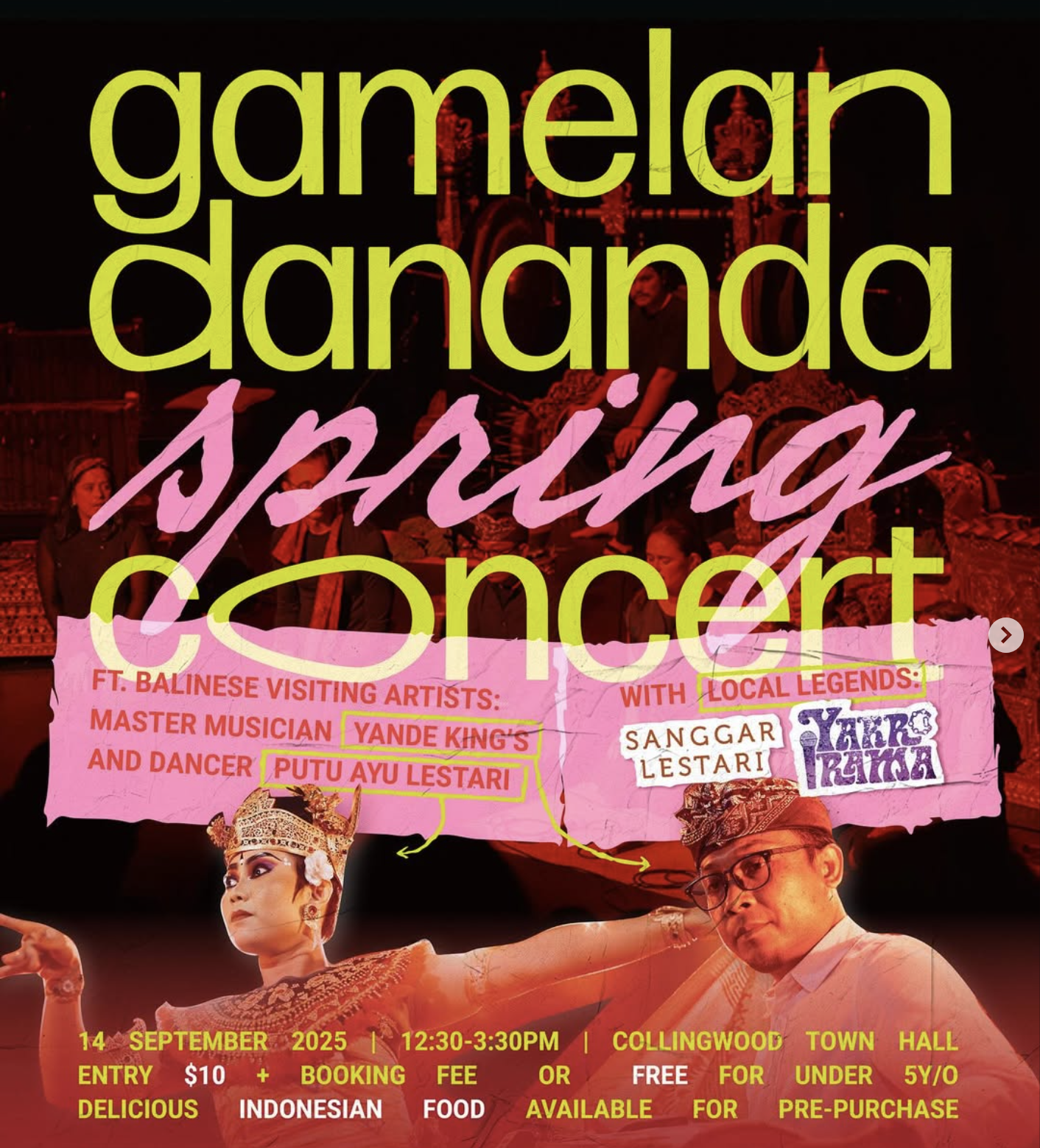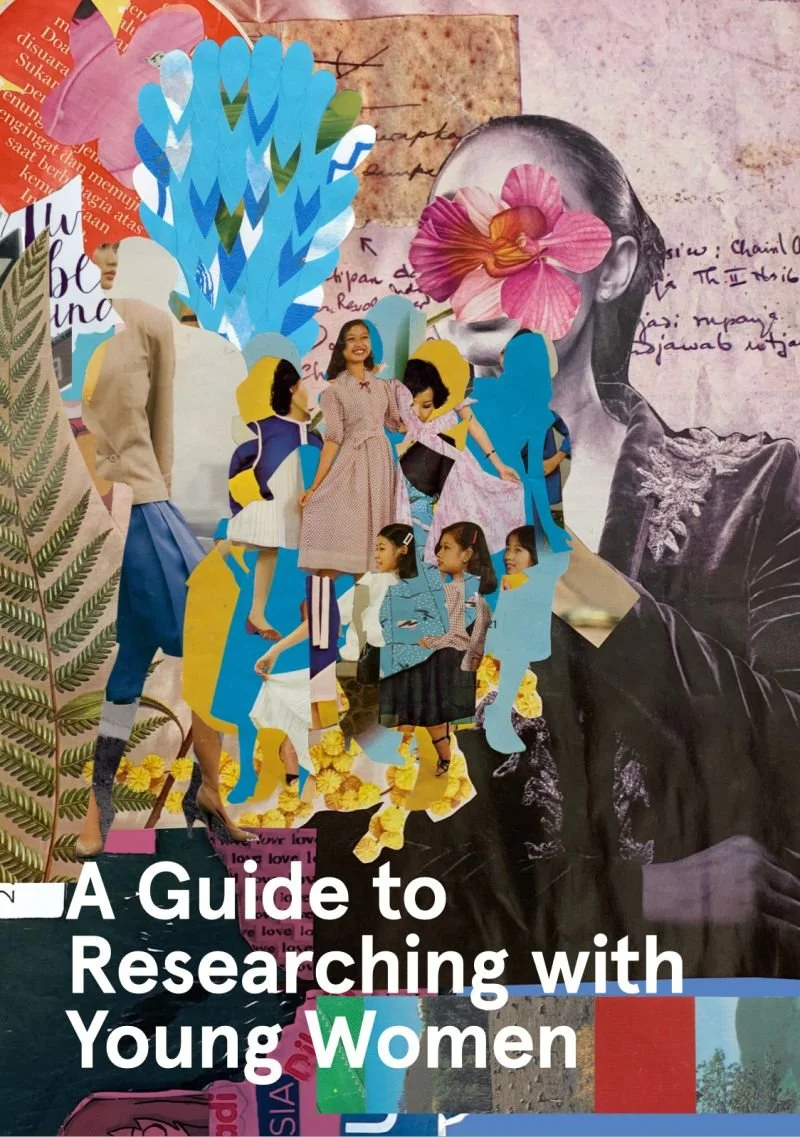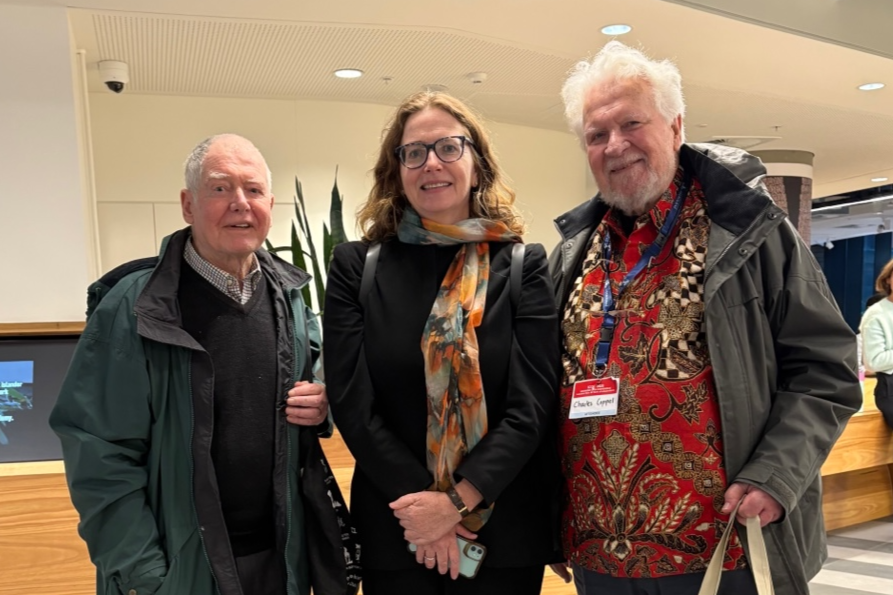Indonesia Council Digest - September 2025
We extend our deep sympathies to those who have been impacted by the violence and unrest that has taken place in Indonesia in recent weeks. This month’s newsletter is crammed with informative publications and podcasts about these protests, including an extended feature by Dana Fahadi, an Indonesian PhD candidate at the University of Melbourne, who shares with us the history and current objectives of the Melbourne Bergerak movement. We’ve also seen gatherings here in Sydney (find out more in the Talking Indonesia podcast about Aliansi Gusar) and elsewhere in Australia, testament to the strength and solidarity of the diaspora.
A brief but heartfelt mention of the ACICIS 30th anniversary celebration held in Canberra last week, which brought together hundreds of alumni and supporters of Indonesian language, mobility, and literacy. The event was a powerful reminder of the extraordinary networks and long-term impact of in-country immersion programs. It was an honour to be invited to speak on behalf of Indonesia Council alongside fellow alumni (and fellow class of 2000 alumni!) Liam Prince and Hillary Mansour, as well as Foreign Minister Penny Wong and Special Envoy for Indian Ocean Affairs Tim Watts.
My remarks focused on the long-term impact of my ACICIS experience, the wonders of student mobility through field schools, the importance of cultural literacy, and the role of both enthusiasm and meaningful investment in supporting regional engagement. Congratulations to the founders, the funders, the Resident Directors, the host institutions and of course the students – here is to another 30 years of transformational in-country experiences.
The anniversary celebrations were followed by the annual Indonesia Update at the Australian National University. Liam Gannon delivered an excellent and informative opening address, with Jemma Purdey offering a historical perspective as respondent. The focus of the Update then turned to climate change, its impact in Indonesia, and how the government is responding.
Please take note that the call for abstracts for ASAA 2026 is now open – more details below. And if you like this newsletter, do forward it to your friends and encourage them to sign up – it’s free!
Salam hangat,
Natali
What’s happening
Building Whole-of-Nation Asia Literacy for the 21st Century
AP4D is hosting a webinar on redefining Asia literacy for today’s strategic environment, coinciding with the launch of a new paper by Philipp Ivanov. The discussion will explore how Australia can strengthen its understanding of Asia by linking education, policy, technology, demography, and advocacy. An expert panel, including The Hon Tim Watts MP, Lydia Santoso, and other distinguished speakers, will consider the initiatives and investments needed to embed Asia literacy as a national priority.
Date: Monday, 22 September 2025
Time: 13:00–14:00 AEST (online)
Register here.
Roundtable on Australian Schools' Engagement with Indonesia
If you’re one of many concerned about the decline in the numbers of Australian students studying the Indonesian language in Australian schools and universities, be sure to register for this forthcoming Roundtable on Australian Schools' Engagement with Indonesia
Date: 20 November 2025
Time: 13:00- 17:00 AEDT (online)
Register here
The Roundtable is hosted by Asialink Education (formerly Asia Education Foundation) at the University of Melbourne and made possible by generous funding from the Australia-Indonesia Institute in the Australian Department of Foreign Affairs and Trade.
The Roundtable aims to identify ways forward that provide all young Australians with opportunities to engage with Indonesia, with Indonesians and with the Indonesian language. The goal of the roundtable is to identify a number of strategies that can be presented to Federal and State Governments and other key stakeholders to inform policy making, targeted funding and resource development.
Forum Discussion: Indonesia’s Protests, State Violence and the Legacy of 1965
For those in Sydney, please come along to this timely discussion on the roots of state violence in Indonesia, tracing connections to the 1965 anti-communist purges and the legacy of Suharto’s New Order regime. The forum will explore how historical memory informs contemporary dissent and consider the potential for collective action and political change.
Date & time: Monday, 22 September 2025, 18:00 AEST
Location: Room 331 Madsen Building, The University of Sydney
More details and register here
International Forum on Spice Route
The annual International Forum on Spice Route kicks off this week in Jakarta (hybrid) and Makassar. This year’s focus is on Spice Routes as Pathways to Sustainable Futures: Bridging Heritage and Innovation. Register to join the sessions here.
Indonesia Research Showcase
For those in Sydney, the Sydney Southeast Asia Centre will host a full-day Indonesia Research Showcase on 25 September 2025. The showcase features short presentations and lively discussions across three thematic sessions: Natural Resources and the Environment; Law, Economy and Culture; and Healthy and Resilient Societies. Find out more and register via the website.
ACICS Bahasa Sesh Challenge
To celebrate 30 years of deepening Australia–Indonesia ties, ACICIS has relaunched the Bahasa Sesh Challenge—a sosmed initiative running until 20 October 2025 that invites Australians to reconnect with Indonesia through language.
Whether you're an ACICIS alum, student, academic, or language enthusiast, you’re invited to share your favourite Indonesian word or phrase in a short video. Post it to your own social media or send it to ACICIS to be featured on their channels.
Tim Watts MP, in his speech at the Acicis anniversary, proposed mantap as his word this year – what can you come up with?
Balinese Gamelan in Melbourne’s Springtime
Melbourne’s own Balinese gamelan orchestra, Gamelan DanAnda, held their Spring Concert this month, bringing together Indonesian and Australian artists in a vivid showcase of music and dance. Highlights included the premiere of Tari Puspa Banksia, a new Balinese–Australian collaborative work by guest composer Yande King’s and dancer Putu Ayu Lestari, performed with local dance troupe Sanggar Lestari.
The afternoon also featured interactive kecak and dance workshops. To close, the concert shifted gears as local dangdut/koplo band Yarra Irama took the stage.
Our Digital Engagement Editor, Billy Adison Aditijanto, was on the ground capturing video highlights and audience reflections on what made the event so special. Find more coverage of the event onThe Perantau Podcast.
Other cool stuff
Tim Tam Martabak
Speaking of going viral… I present to you the new Tim Tam Martabak, a sugary sensation available at Yoi Indonesian Fusion in Melbourne.
When we advocate to the politicians and funding bodies for closer engagement between Australia and Indonesia, maybe we should be leading with (or serving) this (I’m not even kidding).
Indonesian PhD Student Develops World-First AI Soil Mapping Tool in Australia
Marliana Tri Widyastuti, a PhD candidate at the University of Sydney, has developed a groundbreaking AI-based soil mapping system—the first of its kind to be operational globally. Using deep learning, the tool integrates soil moisture data from Tasmania with weather and topography inputs to produce high-resolution, near real-time maps. Farmers in Tasmania are already using the tool to improve irrigation decisions, and Marliana hopes to expand its application to fire-prone areas and agricultural productivity in Indonesia. Awesome work.
A Guide to Researching with Young Women
PUSKAPA, in collaboration with the University of Melbourne’s School of Culture and Communication, has released a bilingual guide (English & Bahasa Indonesia) to support ethical and inclusive research practices with young women in Indonesia.
Led by Annisa Beta and a team of young female researchers across three study areas, Panduan Meneliti Bersama Perempuan Muda offers practical tools, principles, and checklists to help researchers design studies that are sensitive, collaborative, and empowering.
Built on the belief that research should be done with young women—not just about them—this guide is a valuable resource for academics, NGOs, and policymakers alike. Read more here and download it here.
Call for Papers
CFP: ASAA 2026 Conference Now Open!
Abstract submissions are now open for the 2026 Asian Studies Association of Australia (ASAA) Conference, hosted by Deakin University.
Conference Dates: 29 June – 2 July 2026
Location: Deakin Downtown, Melbourne
Theme: Beyond Borders: Reimagining Asian societies in and across a Shifting World
CFP closes: 7 November 2025
Sub-themes include Identity, Transnationalism, and Migration; Language, Cultural Exchange, and Representation; Geopolitics and Regional Cooperation; and Overcoming technological divides, Climate and Sustainability, The Politics of Rapid Change; and The Preservation and Perseverance of Heritage.
ASAA and the conference convenors invite scholars, practitioners, and students working on Asia-related topics to submit proposals that engage with the complexities and possibilities of Asia’s futures. Interdisciplinary and cross-regional approaches are especially welcome.
Jobs
Assistant Professor in Modern Southeast Asian Humanities at UC Berkeley
The Department of South and Southeast Asian Studies at the University of California, Berkeley is now accepting applications for a tenure-track Assistant Professor position in Modern Southeast Asian Humanities.
This is a broad search open to scholars working on any country, culture, or people in Southeast Asia through a humanistic lens. Berkeley has a distinguished tradition in Southeast Asian studies, and the department seeks a scholar with strong research capacity and teaching potential to deepen and expand this legacy.
Applications close 25 October 2025. More info and apply here.
Publications and Podcasts
Rethinking the Role of Indonesians Overseas
Our Digital Engagement Editor, Billy Adison Aditijanto, is keeping up the great work with The Perantau Podcast, which focuses on sharing stories from Australia's Indonesian diaspora.
A new episode has dropped featuring Billy in conversation with Charlotte Setijadi, our expert on the Indonesian diaspora, as she reflects on the changing face of Indonesia’s diaspora and the politics of belonging, from debates on dual citizenship to the ways Indonesians overseas can act as cultural and diplomatic bridges between nations.
Allowance Hikes and the Spark of Mass Protest
Indonesia Council’s Treasurer Elisabeth Kramer (UNSW Sydney) is one of a number of amazing Australian scholars keeping us in the loop with informed analysis of the protests in Indonesia. Her piece, Out of Touch for Indonesia at Melbourne, was one of the first such articles to come out, offering a very timely analysis of how the proposed increase in politicians’ allowances led to mass protests across the country.
Youth Mobilisation and the Legacy of Reformasi
Edward Aspinall (ANU) in ‘Mass protest and the two worlds of Indonesian politics’ for New Mandala drew compelling parallels between the current youth-led protests and the 1998 Reformasi movement. He explores how subcultures of dissent are challenging entrenched patronage politics and rising inequality, and how the political elite’s disconnect from everyday realities is fuelling unrest.
Corruption, Inequality, and Democratic Fragility
Tim Lindsey (University of Melbourne) in ‘What’s behind the rioting in Indonesia?’ for The Conversation examines the deeper roots of the protests—from elite corruption and economic inequality to the symbolic death of gig worker Affan Kurniawan. He raises urgent questions about the role of the military, democratic fragility, and the risk of authoritarian consolidation.
Protest Narratives and Youth Agency
Ian Wilson (Murdoch) critiqued the framing of protests as the work of “unseen actors” or elite provocateurs in his article for Indonesia at Melbourne, ‘Who speaks for the riot? Youth agency and the contest over protest narratives.’ Instead, Wilson draws attention to the agency of new protest actors—especially gig-economy drivers and working-class teenagers—whose voices are often sidelined in mainstream accounts.
Presidential Responses and Middle-Class Grievances
From further afield, Doctoral student Ahmad Syarif (Johns Hopkins) offered this insightful analysis, ‘Unrest Across Indonesia: Where it may lead and how the President should respond’, in which he argues that the president currently views the protests through a security and conspiracy lens—blaming foreign actors and political enemies—rather than acknowledging the middle-class frustrations driving the unrest. This framing risks overlooking the real pressures Indonesians face: inflation, job scarcity, and corruption.
Cats, Protest, and Political Symbolism
Of all the analysis about the protests, I am not ashamed to say this was my favourite: How MPs’ Abandoned Cats Became the Unexpected Symbol of Indonesia’s Protests. Co-authored by Ken M.P. Setiawan, Charlotte Setijadi, and Elisabeth Kramer, this piece revealed how viral images of cats left behind during political unrest became metaphors for elite neglect—and a rallying cry for protestors. I have it on good authority (anecdotal evidence) that many people who don’t know much about Indonesia, but who love cats, read this – an amazing example of diplomasi kucing. How we treat animals often reflects how we treat our fellow human beings, and in both cases, care and kindness has been sorely lacking in recent weeks.
Latest from the Talking Indonesia podcast
Meanwhile, two recent episodes of the Talking Indonesia podcast offer powerful insights into the protests and the broader political moment in Indonesia.
In Indonesia’s New Protest Movements, Rebecca Meckelburg offers a grounded view from Central Java, complicating the Jakarta-centric narrative of the protests. She explores how the death of delivery driver Affan Kurniawan catalysed a wave of anger and mobilisation across at least 47 cities. From housewives to gig workers, the episode addresses the questions of who are these protestors, how did they mobilise so fast, and what do they want?
In a special episode recorded on 7 September, Aliansi Gusar: Overseas Responses to Indonesia’s Protests, Elisabeth Kramer spoke with Indonesian students at the University of Sydney—Mahesti Hasanah, Benni Hasbiyalloh, and Ifana Tungga—who are part of Aliansi Gusar. They reflect on what it means to witness political upheaval from afar, and how the diaspora is organising in solidarity. Mantap.
For your viewing pleasure
Majapahit, Memory, and the Politics of History
In conversation with the ANU Indonesian Students Association, Wayan Jarrah Sastrawan explores how Majapahit has been mythologised in Indonesian nationalist narratives and challenges long-held assumptions about its imperial status. The 90-minutes episode dives into historiography, colonial legacies, and the ethical responsibilities of interpreting the past. From Dutch scholars to New Order-era institutionalization, Jarrah unpacks how historical narratives are constructed—and how Indonesian students and scholars can critically engage with them while fostering pride in a richer, more nuanced understanding of the past.
New Al Jazeera Documentary: Indonesia – Selling a Colonial War
Released to mark the 80th anniversary of Indonesia’s independence, this new documentary examines how the Dutch manipulated the narrative of their colonial war in Indonesia (1945–49) and the lingering challenges of confronting colonial legacies. Featuring leading Australian scholars Robert Cribb (ANU) and Susie Protschky (Vrije Universiteit Amsterdam), the film offers a timely reflection on the global significance of the Indonesian National Revolution. The documentary signals growing recognition of Indonesia’s revolutionary history within the Anglosphere.
Melbourne Bergerak
Huge thanks to University of Melbourne student Dana Fahadi for this write up about the history of Melbourne Bergerak, and how the recent protests have reinvigorated this movement for the Indonesian diaspora.
***
Melbourne Bergerak was born on 23 August 2024, as part of the wave of resistance sparked by the Indonesian election law protests, which prompted the Emergency Alert (Peringatan Darurat) movement. Our first gathering brought around one hundred people to the University of Melbourne campus—students, alumni, workers, friends, and members of the wider Indonesian community. Just days later, on 26 August, we marched to KJRI Melbourne to deliver our demands.
Since then, Melbourne Bergerak has hosted a variety of activities: Kelas Politik (“kepo”), a workshop-style political discussion; Mimbar Bersama, a panel discussion; and Aksi Kamisan. We often join pro-Palestine rallies, too. For many of us—including myself—these spaces are not only about politics but also about finding solidarity and energy in each other.
Still, activism is not always easy to sustain. As life got busier, I found myself attending less often, keeping up with developments in Indonesia only from the sidelines.
That changed on the night of 28 August 2025. Coming home from campus, I opened Instagram and the first thing I saw was a video of an armoured police car running over a Gojek driver—21-year-old Affan Kurniawan. He wasn’t protesting. He was just delivering food. The next day I learned he had died. I didn’t know how it started, but I found myself sobbing.
I re-opened the Melbourne Bergerak WhatsApp group I had archived, and I wasn’t alone. Everyone was enraged. We knew we had to act.
Instead of returning to the KJRI, we chose Federation Square as our site of protest. According to Pipin Jamson, the coordinator of Melbourne Bergerak, the symbolism mattered: just weeks before, the Indonesian community had gathered there to raise the national flag on Independence Day. Now, it became a place to declare another kind of freedom.
On 2 September 2025, more than 400 people gathered. Students, workers, and members of the diaspora travelled from as far as Clayton and Point Cook. Many came dressed in the movement’s three symbolic colours:
Brave Pink (#E44C99): drawn from Mrs Ana, the Jakarta protester who faced down police in a pink jilbab armed only with a bamboo pole and the red-and-white flag.
Hero Green (#01A923): representing Affan’s online motorcycle taxi uniform, a reminder of the everyday worker whose life was taken.
Resistance Blue (#000072): the colour of the “Peringatan Darurat” movement a year earlier, during Prabowo’s inauguration month, symbolising vigilance and ongoing struggle.
Others wore black to mark the “death of democracy.” Together, they brought posters, signs, songs, and spirit.
From 4pm until 6pm, around 15–20 individuals took turns giving speeches, reading poetry, and singing. I joined comrades in performing Darah Juang, Buruh Tani, and Bento—songs of resistance for ordinary people against a corrupt system. I also read the English translation of Wiji Thukul’s Peringatan (Warning), first recited in Indonesian by playwright Faiza Mardzoeki.
One of the most powerful speeches came from my friend Naila, a Master’s student in Public Policy at the University of Melbourne. Dressed in pink to echo Mrs Ana, she reminded us: “Prabowo basically accused anyone who attends protests like this of treason. Seriously, he’s a worse red flag than our red flag exes. He never listens!” The crowd roared.
The issues raised that day cut deep: the young lives lost in protests across Indonesia, the parliament’s shameless wealth against the reality of hunger and poverty, the normalization of militarism, the rise of police brutality, and the diminishing freedom of speech. For the diaspora, standing at Federation Square was a way to say: we see it, we will not be silent, and we will hold the powerful to account.
This protest was not just Melbourne’s. It was part of the International Committee of Indonesia Bergerak, which includes other Bergerak movements involving Indonesian diasporas in Canberra, Brisbane, Perth, Sydney, Vancouver, the USA, Japan, Switzerland, and many more. Together, this network continues to draw international attention and pressure.
For Melbourne Bergerak, the 2 September protest was not an end but a beginning. Our work continues: to be a space for Indonesian diaspora in Melbourne to discuss, to learn, and to raise our voices for justice in Indonesia.
Because even thousands of miles away, our hearts are still burning for our nation.
From Our Correspondent in Bandung: Government Protests
We are pleased to share an on-the-ground perspective from Bandung, where one of our contributors offers reflections on the city’s current atmosphere and unfolding events. For reasons of privacy, this piece has been submitted anonymously.
* * *
Last August was one of the darkest months I have witnessed in recent years in Indonesia. What began as a wave of frustrations over poor governance quickly escalated into a nationwide outcry. It was not a single issue that pushed citizens to the streets; instead, it was the accumulation of bad news, mismanagement, and the blatant indifference of those in power. Every day felt like another reminder that the state had chosen to distance itself from the people it should be serving.
The protest chain started with the demonstration of ojol (ride-hailing drivers, Indonesian: ojek online), who only wanted fairness in wages and protection for their livelihoods. Instead of responding with dialogue, the state met them with repression. The outcome was tragic: lives were lost, and activists were criminalised for daring to speak on behalf of the vulnerable. What should have been an exercise of democratic rights turned into a spectacle of violence and silencing.
Then, as if that were not enough, the violence spread. Police forces, rather than containing their aggression, expanded their attacks. Many of whom were not even part of the protests, were suddenly targeted. Watching videos of students being beaten and chased in their own universities felt surreal. Universities should be safe spaces for critical thought, not battlegrounds for unchecked authority. It was as if the message was clear: no one is safe from state violence, no matter how uninvolved you are.
The hashtag #WargaJagaWarga emerged during this time, and it resonated deeply with me. In a climate where oligarchs in government and the Indonesian House of Representatives turn their backs on citizens, all we have left is each other. Solidarity became our shield and our only source of comfort. While officials dismissed our cries, ordinary people shared food, information, and shelter. It was a bitter irony: the social fabric woven by citizens was stronger and more trustworthy than the institutions supposedly designed to protect us.
I write this with a sense of deep disappointment and frustration. We deserve leaders who listen, not rulers who crush dissent. We deserve policies that protect lives, not policies that criminalise the voices of the people. And yet, if there is any glimmer of hope, it lies in our resilience. Despite the fear and pain, people continue to survive, to help one another, and to imagine a better future. We are battered, yes, but not broken. We will keep trying, and someday, change will come.
Indonesia Council Open Conferences
2001 & 2025
By Harry Aveling and Charles Coppel
ICOC 2001 Organising Committee Members seen at ICOC 2025 (L to R): Harry Aveling, Kate McGregor and Charles Coppel. Absent members: Jemma Purdey (in France), Greg Barton (in Bandung). Photograph by Ken Setiawan.
The Indonesia Council Open Conference (ICOC) returned to the University of Melbourne in July 2025, 24 years after the first ICOC was held there (10-11 July 2001).
The original organising committee comprised Harry Aveling (President), Greg Barton (Vice President), Charles Coppel (Member), Kate McGregor (Postgraduate Representative) and Jemma Purdey (Co-opted Member).
The keynote speaker was Herb Feith. It was his last public address in Australia before his tragic death at a Melbourne railway crossing. Under the title “Reaffirming Faith in the Project of Indonesia”, its message was plain, even forthright: “Don’t give up on Indonesia.”
The 2025 Conference was a powerful demonstration and celebration of “the strength of Indonesian Studies and Indonesia connections across our faculties and across Australia more broadly” as its convenors (Kate McGregor, Edwin Jurriens and Ken Setiawan) had hoped. We have indeed not given up on Indonesia.

